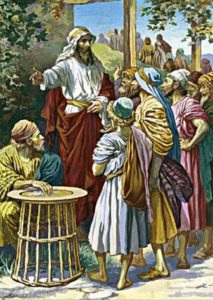A week from now, the month of September will end. In two months, it’s December again. It is nice to have constant confidence in His Holy Will during these changing moments and movements in our lives. Most probably some of us are still trying to keep our 2023 resolutions, yet being in despair and feeling downhearted because we seemingly have failed to fulfill those promises. Our readings today inspire us to heed the call of God to submit to Him through our loving service.
The first reading from the book of Isaiah urges us to seek the Lord whenever we have found ourselves struggling to keep God in our hearts due to the challenges and trials we encounter. God is in control of everything, and we cannot afford to doubt our faith. The Prophet Isaiah says, “Seek the Lord while he may be found, call him while he is near.” because we believe that God’s ways are “as high as the heavens are above the earth.” Hence, God’s ways are far from our thoughts.
The second reading from the book of St. Paul to the Philippians reveals to us how much Paul loved Jesus. His ways of understanding life are completely for Jesus and when he died, it was ultimately a gain for Jesus because Paul worked hard for His kingdom. He influenced the spirituality of those communities where he ministered for Christ, to be with Christ and in Christ forming them “to conduct worthy of the gospel of Christ.” St. Paul labored much so that converts would sustain their lives from the very source of life.
The gospel parable is about the workers in the vineyard. It is a parable narrating to us the aspects of the Kingdom of God. All hired workers at different times agreed to work in the vineyard with a pay of one denarius which was the usual daily wage. However, expectations were for those who came early to receive more than the wage of late comers. This is where the problem started. How do we understand this parable according to its right perspective?
First, the “landowner” in the parable is God. We cannot fathom God’s ways which are oftentimes in conflict with our way of thinking. Humans operate according to logic, which we find in this parable as unfair treatment afforded to the workers. It must be fair. We are critical to express that the wages of the early workers need to be more than that of the workers who worked only for an hour.
We need to accept God’s ways. I believe that God is benevolent and generous in giving gifts and blessings to us. It is His gifts from the heart of God and not from others. Oftentimes, that is where the problem starts, when we are jealous of others because God is more generous. This is the point that we need to realize that Jesus’ parable highlights God’s generosity and goodness. St. Augustine viewed it that, “God is giving us gifts proportionately according to our needs.”
Secondly, the parable tells us that God invites us continuously, regardless of whether you are the first or the last, as usual God is treating us with goodness and generosity. However, God’s way to compensate us is not according to time of service rendered but it is how much we put love in all our works and service. Some believe in just having faith without practicing it, is seriously wrong. We must be truly converted and transformed disciples. Therefore, we must have firmed faith that is a portion of His gifts, we live out faithfully to serve His vineyard with much love.
Thirdly, this parable tells us that when we work in God’s vineyard, His Church, we see to it that our intention is pure in doing good things for the love of Christ. Expecting to earn merits, rewards and to manipulate God because we are doing something for Him, usually turns out a disaster because we are claiming what we think we deserve, but not according to God’s pure revealing love.
Today, we heard that everything is according to God’s love, goodness, and generosity for those who are faithfully living towards the kingdom. Here on earth, Jesus reveals the face of God as He established the new covenant, with a new method of looking at things through His eyes.
I believe that if God gives grace out of His goodness and benevolence, and when all our prayers are answered as compared to others, it is not injustice or unfair because it seems we are favored ones. Maybe others would realize that God’s greatest gift is also an unanswered prayer, and it is only that the recompense of reward has been delayed. There is no reason for us to be jealous when God’s gift is being shared to all.
God bless you.
Fr. Arlon, osa
———————————
El Dictado del Corazón
Vigésimo Quinto Domingo del Tiempo Ordinario, año A
- Isaías 55:6-9
- Salmo 145:3, 8-9, 17-18
- Filipenses 1:20-24,27
- Mateo 20:1-16
Dentro de una semana finalizará el mes de septiembre. En tres meses más, volverá a ser Diciembre. Es bueno tener confianza constante en la Santa Voluntad de Dios durante estos momentos y movimientos de cambio en nuestras vidas. Lo más probable es que algunos de nosotros todavía estemos tratando de cumplir las resoluciones que hicimos para este año 2023, talvez estamos desesperados y desanimados porque no hemos cumplido esas promesas. Nuestras lecturas de hoy nos inspiran a prestar atención al llamado de Dios a someternos a Él.
La primera lectura del libro de Isaías nos insta a buscar al Señor cada vez que nos encontremos luchando por mantener a Dios en nuestros corazones debido a los desafíos y luchas que encontramos. Dios tiene el control de todo y no podemos darnos el lujo de dudar de nuestra fe. El profeta Isaías dice: “Busca al Señor mientras puede ser encontrado, llámalo mientras está cerca”. porque creemos que los caminos de Dios son “tan altos como los cielos sobre la tierra”. Por tanto, los caminos de Dios están lejos de nuestros pensamientos.
La segunda lectura del libro de San Pablo a los Filipenses nos revela cuánto amaba Pablo a Jesús. Sus formas de entender la vida son completamente para Jesús y cuando murió, en última instancia fue una ganancia para Jesús porque Pablo trabajó duro por Su reino. Influyó en la espiritualidad de aquellas comunidades donde ministró para el Señor Jesús, para estar con Cristo y en Cristo formándolos “para una conducta digna del evangelio de Cristo”. San Pablo trabajó mucho para que los conversos sustentaran sus vidas desde la fuente de la vida.
La parábola del evangelio trata sobre los trabajadores de la viña. Es una parábola que nos narra los aspectos del Reino de Dios. Todos los trabajadores contratados en diferentes momentos acordaron trabajar en la viña con una paga de un denario, que era el salario diario habitual. Sin embargo, las expectativas eran que aquellos que llegaban temprano recibirían más que el salario de los que llegaban más tarde. Aquí es donde empezó el problema. ¿Cómo entendemos esta parábola según su perspectiva correcta?
Primero, el “terrateniente” de la parábola es Dios. No podemos comprender los caminos de Dios, que muchas veces están en conflicto con nuestra forma de pensar. Los humanos operan de acuerdo con la lógica, que encontramos en esta parábola como un trato injusto otorgado a los trabajadores. Debe ser justo. Somos críticos para expresar que los salarios de los primeros trabajadores deben ser mayores que los de los trabajadores que trabajaron solo durante una hora.
Necesitamos aceptar los caminos de Dios. Creo que Dios es benevolente y generoso al darnos regalos y bendiciones. Son Sus dones del corazón de Dios y no de otros. Muchas veces es ahí donde empieza el problema, cuando tenemos celos de los demás porque Dios es más generoso. Este es el punto en el que debemos darnos cuenta de que la parábola de Jesús resalta la generosidad y la bondad de Dios. San Agustín lo veía así: “Dios nos está dando dones proporcionalmente a nuestras necesidades”.
En segundo lugar, la parábola nos dice que Dios nos invita continuamente, sin importar si somos los primeros o los últimos, a ser tratados con amor y generosidad. Sin embargo, la forma en que Dios nos compensa no es según el momento en que creemos en simplemente tener fe sin practicarla seriamente, sino según el momento en que verdaderamente nos convertimos y transformamos en discípulos. Por lo tanto, debemos tener fe en que es una porción de Sus dones que vivimos fielmente para servir a Su reino.
En tercer lugar, esta parábola nos dice que cuando trabajamos en la viña de Dios, la Iglesia de Dios, nos aseguramos de que nuestra intención sea pura al hacer cosas buenas por amor a Cristo. Esperar ganar méritos, recompensas y manipular a Dios porque estamos haciendo algo por Él, suele resultar un desastre porque estamos reclamando lo que creemos merecer y no según el amor revelador de Dios.
Hoy escuchamos que todo es según el amor, la bondad y la generosidad de Dios para aquellos que viven fielmente hacia el reino. Aquí en la tierra, Jesús revela el rostro de Dios al establecer el nuevo pacto con un nuevo método de mirar las cosas a través de Sus ojos.
Creo que, si Dios da gracia por su bondad y benevolencia, y cuando todas nuestras oraciones son respondidas en comparación con las de los demás, no es injusticia ni injusto porque parece que somos favorecidos. Quizás otros se darían cuenta de que el regalo más grande de Dios es también una oración sin respuesta, y que la recompensa se ha retrasado. No hay razón para que estemos celosos cuando se comparte el regalo de Dios.
Dios los bendiga.
P. Arlón, osa

